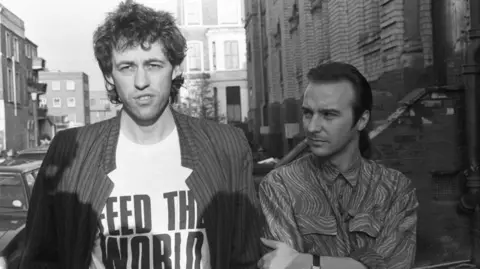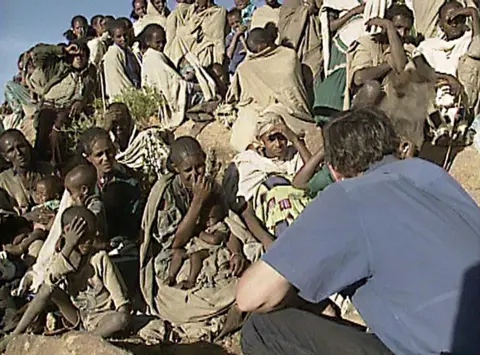MUNDO
‘We knew Christmas before your ancestors’
PUBLICADO
5 meses atrásem
 AFP
AFPForty years on from the original recording, the cream of British and Irish pop music past and present are once again asking whether Ethiopians know it is Christmas.
In 1984, responding to horrific images of the famine in northern Ethiopia broadcast on the BBC, musicians Bob Geldof and Midge Ure corralled some of the biggest stars of the era to record a charity song.
The release of the Band Aid single, and the Live Aid concert that followed eight months later, became seminal moments in celebrity fundraising and set a template that many others followed.
Do They Know It’s Christmas? is back on Monday with a fresh mix of the four versions of the song that have been issued over the years.
But the chorus of disapproval about the track, its stereotypical representation of an entire continent – describing it as a place “where nothing ever grows; no rain nor rivers flow” – and the way that recipients of the aid have been viewed as emaciated, helpless figures, has become louder over time.
“To say: ‘Do they know it’s Christmas?’ is funny, it is insulting,” says Dawit Giorgis, who in 1984 was the Ethiopian official responsible for getting the message out about what was happening in his country.
His incredulity decades on is obvious in his voice and he remembers how he and his colleagues responded to the song.
“It was so untrue and so distorted. Ethiopia was a Christian country before England… we knew Christmas before your ancestors,” he tells the BBC.
But Mr Dawit has no doubt that the philanthropic response to the BBC film, by British journalist Michael Buerk and Kenyan cameraman Mohamed Amin, saved lives.

 Getty Images
Getty ImagesAs the head of Ethiopia’s Relief and Rehabilitation Commission he had managed to smuggle the TV crew into the country. This was despite the government at that time, which was marking 10 years of Marxist rule and fighting a civil war, not wanting news of the famine to get out.
“The way the British people responded so generously strengthened my faith in humanity,” he says, speaking from Namibia where he now works.
He praises the “young and passionate people” behind Band Aid – describing them as “amazing”.
His questioning of the song, whilst also recognising its impact, sums up the debate for many who might feel that when lives need to be saved the ends justify the means.
Geldof was typically robust in defending it responding to a recent article in The Conversation about the “problematic Christmas hit”.
“It’s a pop song [expletive]… The same argument has been made many times over the years and elicits the same wearisome response,” he is quoted as saying.
“This little pop song has kept hundreds of thousands if not millions of people alive.”
He also recognises that Ethiopians celebrate Christmas but says that in 1984 “ceremonies were abandoned”.
In an email to the BBC, Joe Cannon, the chief financial officer of the Band Aid Trust, said that in the past seven months the charity has given more than £3m ($3.8m) helping as many as 350,000 people through a host of projects in Ethiopia, as well as Sudan, Somaliland and Chad.
He adds that Band Aid’s swift action as a “first responder” encourages others to donate where funds are lacking, especially in northern Ethiopia, which is once again emerging from a civil war.
But this is not enough to dampen the disquiet.
In the last week, Ed Sheeran has said he is not happy about his voice from the 2014 recording – made to raise funds for the West African Ebola crisis – being used as his “understanding of the narrative associated with this has changed”.
He was influenced by British-Ghanaian rapper Fuse ODG, who himself had refused to take part a decade ago.
“The world has changed but Band Aid hasn’t,” he told the BBC’s Focus on Africa podcast this week.
“It’s saying there’s no peace and joy in Africa this Christmas. It’s still saying there’s death in every tear,” he said referring to the lyrics of the 2014 version.
“I go to Ghana every Christmas… every December so we know there’s peace and joy in Africa this Christmas, we know there isn’t death in every tear.”
Fuse ODG does not deny that there are problems to be resolved but “Band Aid takes one issue from one country and paints the whole continent with it”.
The way that Africans were portrayed in this and other fundraising efforts had had a direct effect on him, he said.
When growing up “it was not cool to be African in the UK… [because of] the way that I looked, people were making fun of me”, the singer said.
Research into the impact of charity fundraisers by British-Nigerian King’s College lecturer Edward Ademolu backs this up.
He himself remembers the short films shot in Africa by Comic Relief, which had been influenced by Band Aid, and that his “African peers at [a British] primary school would passionately deny their African roots, calling all Africans – with great certainty – smelly, unintelligent and equated them to wild animals”.
Images of dangerously thin Africans became common currency in efforts to elicit funds.
The cover for the original Band Aid single, designed by pop artist Sir Peter Blake, features colourful Christmas scenes contrasted with two gaunt Ethiopian children, in black and white, each eating what looks like a life-saving biscuit.
For part of the poster for the Live Aid concert the following year, Sir Peter used a photograph of the back of an anonymous, naked, skeletal child.
That image was used again in the art work for the 2004 release and it has appeared once more this year.
For many working in the aid sector, as well as academics who study it, there is shock and surprise that the song and its imagery keep coming back.
The umbrella body Bond, which works with more than 300 charities including Christian Aid, Save the Children and Oxfam, has been very critical of the release of the new mix.
“Initiatives like Band Aid 40 perpetuate outdated narratives, reinforce racism and colonial attitudes that strip people of their dignity and agency,” Lena Bheeroo, Bond’s head of anti-racism and equity, said in a statement.
Geldof had previously dismissed the idea that Band Aid’s work was relying on “colonial tropes”.
The way that charities raise funds has undergone big changes in recent years.

 Getty Images
Getty ImagesWhile remaining critical, Kenyan satirist and writer Patrick Gathara, who often mocks Western views of Africa, agrees things have shifted.
“There has been a push within humanitarian agencies to start seeing people in a crisis first as human beings and not as victims, and I think that’s a big, big change,” he tells the BBC.
“In the days of Live Aid, all you really had were these images of starvation and suffering… the idea that these are people were incapable of doing anything for themselves and that was always a misconception.”
The fallout from the Black Lives Matter protests added impetus to the change that was already happening.
A decade ago, a Norwegian organisation Radi-Aid made it its mission to highlight the way that Africa and Africans were presented in fundraising campaigns using humour.
For example, it co-ordinated a mock campaign to get Africans to send radiators to Norwegians who were supposedly suffering in the cold.
In 2017, Sheeran himself won one of their “Rusty Radiator” awards for a film he made for Comic Relief in Liberia in which he offered to pay for some homeless Liberian children to be put up in a hotel room.
The organisers of the awards said “the video should be less about Ed shouldering the burden alone but rather appealing to the wider world to step in”.
University of East Anglia academic David Girling, who once wrote a report for Radi-Aid, argues that its work is one of the reasons that things have shifted.
More and more charities are introducing ethical guidelines for their campaigns, he says.
“People have woken up to the damage that can be caused,” he tells the BBC.
Prof Girling’s own research, carried out in Kibera, a slum area in Kenya’s capital, Nairobi, showed that campaigns involving and centred on those who are the targets of the charitable assistance could be more effective than the traditional top down efforts.
Many charities are still under pressure to use celebrities to help raise awareness and money. The professor says that some media outlets will not touch a fundraising story unless a celebrity is involved.
But work by his colleague Martin Scott suggests that big stars can often distract from the central message of a campaign. Whereas the celebrity might benefit, the charity and the understanding of the issue that it is working on lose out.
If a Band Aid-type project were to get off the ground now it would have to be centred on African artists, music journalist Christine Ochefu tells the BBC.
“The landscape for African artists and African music has changed so much that if there was a new release it would need to come from afrobeats artists or amapiano artists or afro-pop artists,” she argues
“I don’t think people could get way without thinking about the sentiment and imagery associated with the project and it couldn’t continue the saviour narrative that Band Aid had.”
As King’s College academic Dr Ademolu argues: “Perhaps it’s time to abandon the broken record and start anew – a fresh tune where Africa isn’t just a subject, but a co-author, harmonising its own story.”


You may also be interested in:

 Getty Images/BBC
Getty Images/BBCRelacionado
MUNDO
Família adota cachorrinha abandonada na rua por mulher de moto; tentou alcançar tutora
PUBLICADO
11 horas atrásem
18 de abril de 2025O amor para combater a maldade. A cachorrinha que foi abandonada numa rua deserta pela ex-tutora, pilotando uma moto, é adotada justamente pela família que a encontrou e resgatou. Os nomes desses verdadeiros seres humanos não foram divulgados.
Em Barra Velha, SC, as imagens de uma mulher, pilotando uma moto, e abandonando a cadelinha, causaram indignação. A maltês, de 15 anos, foi cuidada por veterinários e técnicos da Fundação Municipal do Meio Ambiente (Fundema) depois de ser encontrada.
De acordo com a Fundema, a família que achou a cachorrinha, que ganhou o nome de Julie, demonstrou interesse em adotá-la. Como ela foi muito bem tratada por eles, o processo será rápido.
Amor à primeira vista
Julie foi encontrada perdida no meio de uma rua deserta. Mas as imagens mostraram que a pequena tentou alcançar a ex-tutora, correndo em vão atrás da moto.
A família que encontrou a cachorrinha foi autorizada a adotar a dog. A Fundema apenas prepara a formalização do trâmite burocrático.
De acordo com a fundação, o motivo é que as pessoas que salvaram o pet demonstraram “muito carinho e amor” por ela.
Leia mais notícia boa
- Caramelo abandonado é adotado em posto, leva vida de rei e hoje salva vidas; Frentiscão
- Motociclista se encanta com pitbull abandonado na estrada, adota o bichinho e ele fica lindo; vídeo
- Filhote abandonada com problema grave de pele é tratada, fica linda e vai ser adotada
Cuidados veterinários
O presidente da Fundema, Kaiann Barentin, disse que a cachorrinha está saudável e não tem, aparentemente, nenhuma alteração. Segundo ele, a doguinha foi cuidadosamente examinada e passa bem.
Por cautela, Julie será submetida a mais exames de saúde para verificar o estado geral dela.
É importante porque se trata de um animal de 15 anos que estava sob a guarda de uma pessoa que a abandonou.
Ex-tutora alega problemas mentais
A tutora, única suspeita de abandonar Julie na estrada, alegou surto psicótico e desorientação no momento do ato.
Pela lei pena brasileira, pessoas diagnosticadas com transtornos de ordem mental não podem ser punidas, como as demais.
Porém, a Fundema instaurou procedimento administrativo para aplicação de multa contra a mulher.
Já a Polícia Civil abriu um inquérito para apurar o crime de maus-tratos, segundo o Boa Notícia Brasil.
 Julie, essa simpática Maltês de 15 anos, abandonada pela ex-tutora na rua, agora terá uma família humana nova e que a ama muito. – Foto: Fundema
Julie, essa simpática Maltês de 15 anos, abandonada pela ex-tutora na rua, agora terá uma família humana nova e que a ama muito. – Foto: Fundema
Leia Mais: Só Notícias Boas
Relacionado
MUNDO
Implante de próteses faz brasileiro voltar a andar; teve 2 pernas amputadas
PUBLICADO
12 horas atrásem
18 de abril de 2025Vida nova! O gaúcho Jedimar de Oliveira, de 37 anos, morador de Caxias do Sul, RS, recebeu um implante de próteses e voltou a andar, após quase um ano. O brasileiro, que teve as duas pernas amputadas, foi beneficiado por uma técnica usada é inovadora, a ostointegração, semelhante à aplicada nos implantes dentários.
Oito meses depois da amputação provocada por uma vasculite (inflamação da parede dos vasos sanguíneos, que pode afetar qualquer parte do corpo), Jedimar voltou a sentir o prazer de pisar no chão.
“O que mais me perguntam é se sinto dor. E não, não sinto nada. É como se minhas pernas ainda estivessem aqui. Desde que instalei as próteses, tenho a consciência de onde estou pisando”, disse o homem.
Como funciona
As próteses mantêm Jedimar de pé e foram instaladas com a mesma técnica utilizada em implantes dentários.
A chamada osteointegração implantou na tíbia de Oliveira uma haste metálica e as próteses foram acopladas diretamente nela, o que facilita a adaptação e garante movimentos muito próximos dos naturais.
A operação realizada pela equipe de ortopedia do Pompéia Ecossistema de Saúde foi a primeira da América Latina feita nas duas pernas e anexada à tíbia.
Leia mais notícia boa
- Após 18 anos, mulher volta a falar por causa de neuroprótese; inovador!
- Aos 88 anos, idosa faz próteses para ajudar mulheres que fizeram mastectomia
- Roseana Murray usa prótese biônica pela primeira vez após ataque de pitbulls
Reaprender a caminhar
As duas hastes metálicas são implantadas nas tíbias de Jedimar para que consiga ter segurança para ficar de pé e andar. As próteses são acopladas com precisão, segundo NB Notícias.
A coordenadora do curso de Fisioterapia da FSG, Alexandra Renosto, explicou que antes do grande dia, de colocar as próteses, Jedimar fez uma série de exercícios para “reaprender a caminhar”.
“Não é exagero dizer que ele precisou reaprender a caminhar. Ele ainda está, inclusive, em processo de aprendizagem. Precisamos respeitar a integração do osso com o implante e começamos de forma progressiva a soltar o peso dele nas próteses”, disse.
Osteointegração no Brasil
Desenvolvida na Suécia nos anos 1990, a osteointegração é uma técnica considerada recente no Brasil devido ao custo elevado.
No caso de Jedimar, a equipe que o tratou fez campanha para arrecadar recursos e financiar o tratamento. Deu certo!
A inovação foi trazida ao país pelo ortopedista Marcelo Souza e pelo protesista Tiago Bessa, que realizaram o primeiro procedimento do tipo em 2022, em uma paciente com amputação na perna direita devido a câncer ósseo.
Desde então, 24 pacientes já passaram pela técnica no Brasil e na Argentina.
 O brasileiro Jedimar é o primeiro no país a receber implante de próteses nas duas pernas amputadas e consegue andar. Para conseguir receber os implantes, a equipe do hospital fez campanha para arrecadar dinheiro. Foto: @J3dmar
O brasileiro Jedimar é o primeiro no país a receber implante de próteses nas duas pernas amputadas e consegue andar. Para conseguir receber os implantes, a equipe do hospital fez campanha para arrecadar dinheiro. Foto: @J3dmar
Veja o Jedimar de Oliveira caminhando normalmente com as próteses:
Relacionado
MUNDO
Sai ranking das melhores comidas de rua do mundo; coxinha na lista!
PUBLICADO
12 horas atrásem
18 de abril de 2025Monique de Carvalho
18 / 04 / 2025 às 09 : 56
A coxinha é a comida que representa nosso país no ranking das melhores comidas de rua do mundo. – Foto: TesteAtlas
Comida de rua é mais do que alimentação: é cultura, memória e afeto. E o mundo todo parece estar descobrindo isso, prato por prato. Um novo ranking divulgado pelo site TasteAtlas mostrou quais são as melhores comidas de rua do mundo— e o Brasil ganhou seu espacinho com a saborosa coxinha!
O ranking foi formado com base nas notas dadas por pessoas do mundo todo, que experimentaram os pratos em seus países de origem. A lista virou uma verdadeira viagem gastronômica, passando por sabores da Argélia, China, Indonésia, México, Índia e, claro, do Brasil.
Entre bolinhos recheados, massas fritas e combinações exóticas, a coxinha brasileira se destacou. Mesmo sem estar no topo, o fato de ter sido lembrada entre tantas delícias do planeta já é motivo de orgulho pra gente!
As campeãs do sabor
O topo do ranking ficou com pratos de três países diferentes, mostrando a diversidade e criatividade que a comida de rua pode ter. Em primeiro lugar, veio a Karantika, da Argélia. Feita com farinha de grão-de-bico, água, óleo, pimenta, sal e ovos, a mistura vai ao forno e vira uma espécie de torta douradinha por fora e cremosa por dentro. É servida quentinha em barraquinhas e padarias, principalmente na cidade de Oran.
O segundo lugar ficou com o Guotie, um tipo de dumpling chinês muito famoso. O bolinho é recheado com carne de porco, repolho, gengibre, cebolinha e outros temperos. A técnica de preparo também é especial: primeiro se frita a base, depois se adiciona água para cozinhar no vapor. O resultado é uma delícia crocante e suculenta ao mesmo tempo.
Na terceira posição, a Indonésia marcou presença com o Siomay, um bolinho de peixe no vapor. Ele vem acompanhado de ovos, batatas, tofu e até melão amargo. Tudo é servido com um molho de amendoim bem temperado, molho de soja doce e suco de limão. Uma explosão de sabores!
Leia mais notícia boa:
Coxinha brasileira representa no ranking
O Brasil apareceu na 62ª posição com a amada coxinha de São Paulo. O salgado, tão comum em padarias e lanchonetes, ganhou o coração dos avaliadores. A casquinha crocante e dourada por fora, com recheio macio e cremoso de frango desfiado por dentro, fez sucesso.
A coxinha representa bem o jeitinho brasileiro de transformar ingredientes simples em algo especial. É comida de festa, de lanche rápido, de infância. E agora, também é reconhecida mundialmente como uma das melhores comidas de rua!
Top 10 das melhores comidas de rua segundo o TasteAtlas
- Karantika – Argélia
- Guotie – China
- Siomay – Indonésia
- Quesabirria – México
- Parotta – Índia
- Kulcha de Amritsari – Índia
- Ohn no khao swè – Mianmar
- Tacos – México
- Shawarma – Líbano
- Bánh mì – Vietnã
TasteAtlas
A lista do TasteAtlas é mais do que um ranking. Ela mostra como a comida de rua é parte essencial da identidade dos povos. São pratos feitos com carinho, vendidos em barraquinhas, mercados ou pequenas lanchonetes, muitas vezes com receitas passadas de geração em geração.
O TasteAtlas é uma plataforma especializada em gastronomia mundial. O site reúne informações sobre comidas típicas, bebidas, ingredientes e pratos regionais, sempre com base nas experiências reais dos usuários.
Veja a lista completa das melhores comidas do mundo neste link.

Karantika, da Algeria – Foto: TesteAtlas

Guotie, da China – Foto: TesteAtlas

Siomay, da Indonésia – Foto: TesteAtlas

Birria tacos (Quesabirria), do México – Foto: TesteAtlas

Parotta, da Índia – Foto: TesteAtlas
Relacionado
PESQUISE AQUI
MAIS LIDAS

 MUNDO5 dias ago
MUNDO5 dias agoVovó sem celular ganha câmera de segurança para conversar com a família e diverte as redes; vídeo

 POLÍTICA5 dias ago
POLÍTICA5 dias agoCharge do JCaesar: 14 de abril

 MUNDO5 dias ago
MUNDO5 dias agoO escritório alemão do cartel limpa a participação do UniCredit no Commerzbank – DW – 14/04/2025

 POLÍTICA4 dias ago
POLÍTICA4 dias agoSenador pede que ministro explique alta recorde de…
Warning: Undefined variable $user_ID in /home/u824415267/domains/acre.com.br/public_html/wp-content/themes/zox-news/comments.php on line 48
You must be logged in to post a comment Login